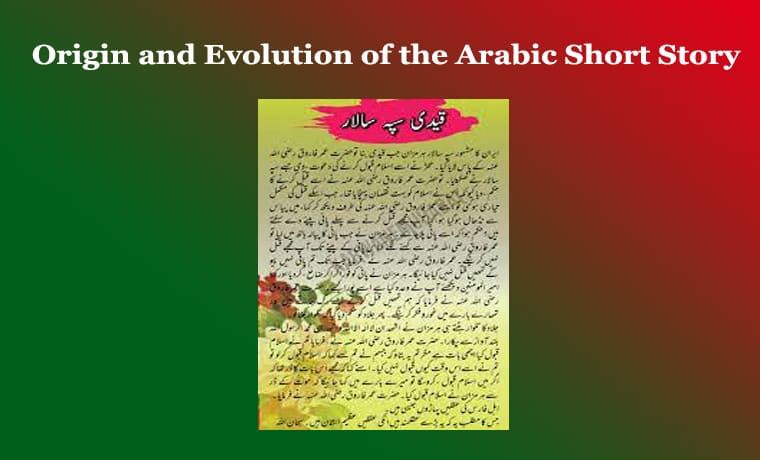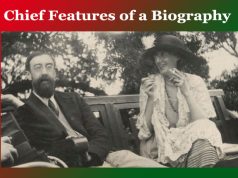Origin and Evolution of the Arabic Short Story
Origin and Evolution of the Arabic Short Sory
Introduction:
The venerable annals of Arabic literature unfold a godown of unparalleled richness, replete with the legacy of centuries and a profound impact on the global literary milieu. Within this literary mosaic, the Arabic short story emerges as a distinct and dynamic form, evolving over epochs into a potent medium of artistic expression. This comprehensive exploration embarks on an exhaustive journey, meticulously unraveling the nuanced origins and developmental epochs of the Arabic short story from antiquity to its contemporary manifestations as follows.
Epoch of Antiquity: The Pre-Islamic Period
The nascent roots of the Arabic short story stretch back to the pre-Islamic era, characterized by an oral tradition steeped in poetic narratives. In this epoch, storytelling constituted an integral facet of Arab culture, with tales woven intricately into the fabric of the community, perpetually passed down through the corridors of time. Themes of honor, bravery, and tribal dynamics permeated these early narratives, laying the foundation for the embryonic stage of the Arabic short story.
Luminous Islamic Golden Age: 8th to 14th Century
The radiant Islamic Golden Age witnessed an efflorescence of arts and sciences, casting its benevolent glow on literature. Within this epoch, the maqama, a literary fusion of prose and poetry, emerged as a precursor to the Arabic short story. The maqamat, attributed to the luminary Al-Hamadhani, featured episodic tales narrated by an itinerant protagonist, setting the stage for the evolution of the short story as an independent and sophisticated literary form.
Reverberations of One Thousand and One Nights: 9th Century Onward
The resounding echoes of The Arabian Nights, also known as One Thousand and One Nights, resonated throughout the literary landscape, exerting a seminal influence on Arabic storytelling. A compendium of tales spanning centuries, The Arabian Nights embraced myriad genres, from enchanting fairy tales to didactic fables and captivating anecdotes. The intricacy of these narratives and the diversity of characters within this opulent collection served as a crucible for the crystallization of the short story genre.
Ottoman Epoch: 16th to 19th Century
The expansive canvas of the Ottoman era witnessed both a continuity of literary traditions and an infusion of innovation within the realm of Arabic literature. Short stories burgeoned as a favored form of entertainment, delving into themes of love, morality, and societal dynamics. Eminent authors such as Al-Jahiz and Ibn al-Nabih made indelible contributions, experimenting with narrative structures and character delineation, thereby sculpting the contours of the modern Arabic short story.
Lustrous Nahda Movement: 19th Century Renaissance
The 19th century heralded the Nahda movement, an intellectual renaissance that breathed new life into Arabic literature. Short stories ascended to prominence as writers grappled with contemporary issues and the winds of societal change. Pioneering figures like Ahmad Taymour of Egypt and Jurji Zaydan of Lebanon played pivotal roles in shaping the modern Arabic short story, infusing it with a socio-political vibrancy reflective of the times.
20th Century Arabic Short Story: Modernization and Experimentation
The 20th century unfolded as a crucible of literary movements across the Arab world, spurred by the twin forces of modernization and globalization. Short stories, acting as conduits for societal introspection, bore witness to the dynamic shifts in themes and styles. Visionaries such as Naguib Mahfouz (Egypt), Yusuf Idris (Egypt), and Tayeb Salih (Sudan) explored existential and socio-political realms, thereby contributing to the diversification of the Arabic short fiction landscape.
Unfolding Landscape: 21st Century Dynamics
In the 21st century, the Arabic short story continues its evolutionary trajectory, mirroring the complexities of contemporary life. A new generation of writers, including luminaries like Hoda Barakat (Lebanon), Ahmed Saadawi (Iraq), and Raja Alem (Saudi Arabia), embarks on explorations of diverse themes. These writers employ innovative narrative techniques, addressing issues pertinent to the modern Arab world and ensuring that the tradition of the Arabic short story remains a vibrant and dynamic force in the global literary panorama.
Conclusion:
The Arabic short story, having traversed a panoramic odyssey through the corridors of time, stands as a testament to the enduring resilience and adaptability of Arabic literature. From its nascent origins in pre-Islamic narratives to its contemporary expressions in the 21st century, the Arabic short story has evolved into a multifaceted and dynamic entity, casting its indelible imprint on the global literary canvas. As writers continue to push the boundaries of creative expression, the tradition of the Arabic short story remains a veritable font of inspiration, resonating across epochs and offering a perennial wellspring of artistic vitality. 0 0 0.
Origin and Evolution of the Arabic Short Story
Analytical Studies of Some Arabic Short Stories
- Izz al-din al-Madani’s Short Story ‘The Tale of the Lamp’ — An Analytical Study
- Zakariyya Tamir’s Short Story ‘A Lonely Woman’ — An Analytical Study
- Tayeb Salih’s Short Story ‘The Doum Tree of Wad Hamid’ — An Analytical Study
- Tayeb Salih’s Short Story ‘A Handful of Dates’— An Analytical Study
- Muhammad al-Zafzaf’s Short Story ‘The Sacred Tree’ — An Analytical Study
- Ibrahim al-Faqih’s Short Story ‘Excerpt from the Book of the Dead’ — An Analytical Study
- Najib Mahfuz’s Short Story ‘Qismati and Nasibi’ — An Analytical Study
- Hanan al-Shaykh’s Short Story ‘Yasmine’s Picture’ — An Analytical Study
- Muhammad Shukri’s Short Story ‘The Night and the Sea’ — An Analytical Study
- Idwar al-Kharrat’s Short Story ‘At the Theatre’ — An Analytical Study
- Salwa Bakr’s Short Story Ancestral Hair — An Analytical Study
- Fuad al-Takarli’s Short Story ‘A Hidden Treasure’ — An Analytical Study
- Layla al- Uthma’s Short Story ‘Night of Torment — An Analytical Study
- Yusuf Idris’ Short Story ‘A Tray from Heaven’ — An Analytical Study
.







